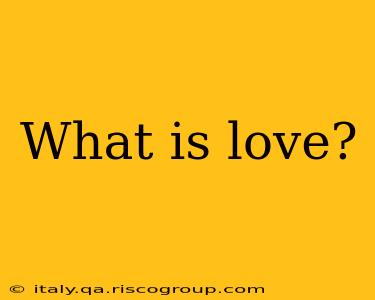Love. The word itself conjures images of romance, family, and deep connection. But what is love, really? It's a question pondered by philosophers, poets, and everyday people for centuries, and there's no single, simple answer. This exploration delves into the multifaceted nature of love, examining its various forms, its biological underpinnings, and its impact on our lives.
The Many Faces of Love: Beyond Romantic Ideals
While romantic love often dominates popular culture's portrayal, love encompasses a far broader spectrum of human experience. We can categorize love into several distinct types, each with its own unique characteristics:
-
Romantic Love: This is the passionate, often idealized form of love frequently depicted in movies and novels. It's characterized by intense attraction, desire, and a deep emotional connection. Key components include intimacy, passion, and commitment (according to Sternberg's Triangular Theory of Love).
-
Familial Love: The bond between family members, often characterized by unconditional support, shared history, and a sense of belonging. This love can be profound and enduring, shaping our identities and providing a foundation for emotional security.
-
Platonic Love: Deep affection and care between friends, devoid of romantic or sexual desire. Platonic love provides companionship, support, and shared experiences, enriching our lives in countless ways.
-
Self-Love: Acceptance and appreciation of oneself, including strengths and weaknesses. Self-love is crucial for mental well-being and forms the basis for healthy relationships with others.
-
Compassionate Love: A selfless and altruistic form of love, characterized by empathy, kindness, and a desire to alleviate suffering. This type of love often manifests in acts of service and compassion towards others.
The Biology of Love: Hormones and Neurotransmitters
Beyond the emotional and social aspects, love has a significant biological component. Specific hormones and neurotransmitters play crucial roles in the experience of love:
-
Oxytocin: Often called the "love hormone," oxytocin is released during physical touch and intimacy, fostering feelings of bonding and attachment.
-
Vasopressin: Similar to oxytocin, vasopressin contributes to pair-bonding and long-term commitment in relationships.
-
Dopamine: This neurotransmitter is associated with pleasure and reward, contributing to the intense feelings of euphoria experienced in the early stages of romantic love.
-
Serotonin: Levels of serotonin can fluctuate during romantic love, potentially explaining the obsessive thoughts and behaviors sometimes associated with passionate love.
The Impact of Love on Well-being
The experience of love, in its various forms, profoundly impacts our physical and mental well-being. Studies have shown that strong social connections, including loving relationships, are associated with:
-
Increased lifespan: Individuals with strong social support networks tend to live longer and healthier lives.
-
Improved immune function: Love and social connection can strengthen the immune system, making individuals less susceptible to illness.
-
Reduced stress and anxiety: Feeling loved and supported can buffer against the negative effects of stress and anxiety.
-
Enhanced emotional resilience: Strong relationships provide a foundation for coping with adversity and overcoming challenges.
Conclusion: A Continuous Journey of Discovery
The question, "What is love?" remains complex and multifaceted. It's not a destination but rather a continuous journey of discovery, shaped by individual experiences, cultural contexts, and biological factors. Understanding the various forms of love, its biological basis, and its profound impact on our lives allows us to appreciate its significance and cultivate healthy, fulfilling relationships. The exploration of love is a lifelong endeavor, rich with meaning and potential for growth.

